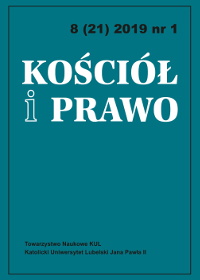Processus brevior coram Episcopo – czy zupełne novum?
Processus brevior coram Episcopo – a Complete Novelty?
Author(s): Wojciech GóralskiSubject(s): Law, Constitution, Jurisprudence, Canon Law / Church Law
Published by: Towarzystwo Naukowe KUL & Katolicki Uniwersytet Lubelski Jana Pawła II
Keywords: abbreviated process before bishop; bishop; marriage
Summary/Abstract: The establishment of the processus matrimonialis brevior coram Episcopo is a significant change introduced by Pope Francis’ motu proprio Mitis Iudex Dominus Iesus, which is a complete novelty in relation to the legislation in force until recently. This is a special type of marriage annulment proceedings that may apply in cases where the request was made by both spouses or by one of them with the consent of the other and is supported by particularly obvious arguments. In addition to the speed and simplification of the procedure, this process demonstrates the special care and vigilance of the diocesan bishop in relation to his faithful who are concerned about their marital status.An abbreviated process held before a bishop, while constituting a significant novelty in relation to the legislation in force in 2015, is deeply rooted in the canonical tradition, dating back to the first centuries of Christianity.The author first presents the ancient institution of episcopalis audientia, introduced by Emperor Constantine’s edict, sustained by imperial legislation; then the judicial authority of the medieval bishop is discussed (showing that the evolution of the justice system, under which officials emerged, did not exclude in any way the personal exercise of jurisdiction by a bishop), and finally the bishop is presented as a judge in the period from the Council of Trent to CIC/83.The extraordinary nature of the abbreviated trial before a bishop implies, on the one hand, a far-reaching simplification of the procedure, and on the other hand, indicates the central role of the bishop in judicial ministry which he performs as the supreme judge in his particular Church. The abbreviated marital process before a bishop is more like a return to antiquity than an absolute novelty. There is a significant analogy between the ancient institutions of episcopalis audientia and processus brevior. Pope Francis did not merely want to harmonize other methods of exercising potestas iudicandi (in the case of obvious invalidity of marriage) with the already existing procedures, but first of all to restore a more authentic and profound meaning of the mission of the diocesan bishop.
Journal: Kościół i Prawo
- Issue Year: 8/2019
- Issue No: 1
- Page Range: 169-186
- Page Count: 16
- Language: Polish

